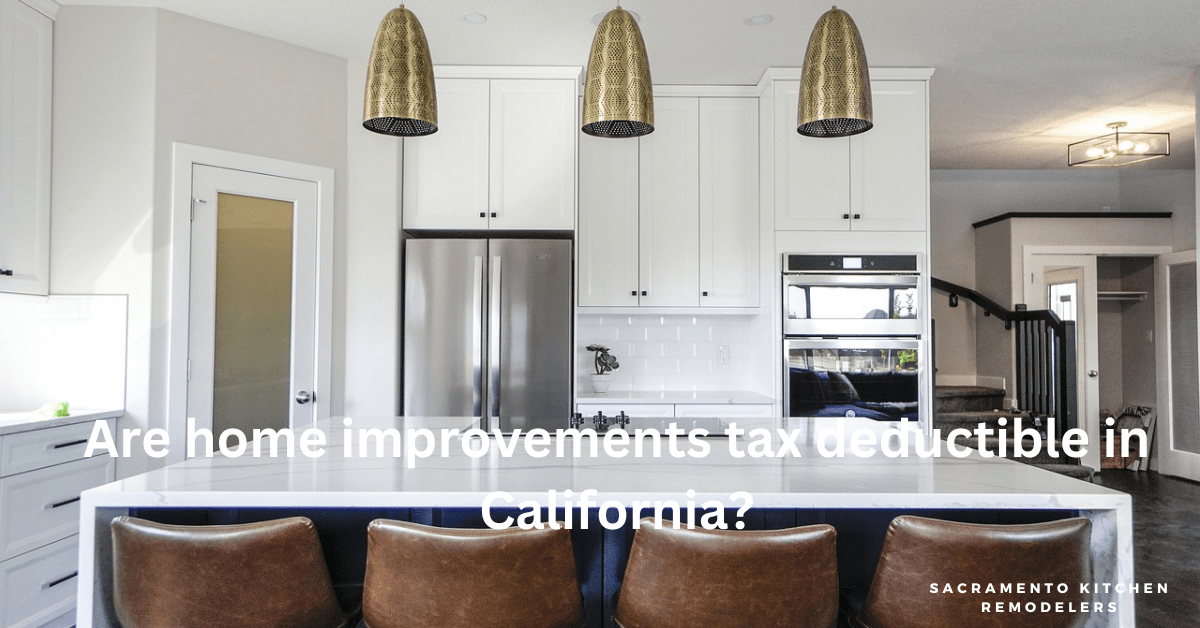In California, home improvements are not directly tax-deductible, but they can indirectly reduce your tax liability by increasing your home’s cost basis, thereby potentially lowering your taxable capital gain when you sell your property.
California offers home improvement grants that can reduce the out-of-pocket costs for improvements, further impacting your taxes. Energy-efficient home improvements and medical home improvements also offer specific tax benefits. Understanding these tax implications can help California homeowners strategically plan home improvements to maximize tax benefits during tax season.
Are home improvements like Kitchen Remodeling tax deductible in California?
Home improvements like Kitchen Remodeling are not directly tax-deductible in California. However, they can increase the cost basis of your home, which can lower your taxable capital gain if you sell your property. The IRS Publication 523 outlines the specific rules and guidelines for this.
Home Improvements and Cost Basis
When you make improvements to your home, such as renovations or remodeling, these costs can be added to the original purchase price of your home. This is known as increasing your ‘cost basis’. For example, if you purchased your home for $500,000 and spent $50,000 on improvements, your cost basis would be $550,000.
Impact on Capital Gains Tax
When you sell your home, the cost basis is subtracted from the sale price to determine your capital gain. In California, if you’re single, you can exclude up to $250,000 of this gain from your income for tax purposes. If you’re married and file jointly, you can exclude up to $500,000. Therefore, a higher cost basis can result in lower taxable capital gain. For instance, if you sell your home for $800,000, your capital gain would be $250,000 without improvements, but only $200,000 with the $50,000 improvements.
California Home Improvement Grants
While home improvements are not tax-deductible, California does offer various home improvement grants. These grants can indirectly impact your taxes as they may reduce the out-of-pocket costs for improvements, thereby affecting the cost basis of your home. However, the specifics of these grants and their tax implications can vary, so it’s recommended to consult with a tax professional.
What home improvements are tax deductible in California?
Home improvements that are tax deductible in California, according to the Internal Revenue Service (IRS), are home improvements that increase the value of your home, prolong its useful life, or adapt it to new uses can be added to the home’s cost basis, which can lower potential capital gains tax when you sell the home.
California homeowners can take advantage of specific tax credits for energy-efficient home improvements. The Residential Energy Efficient Property Credit allows homeowners to claim a credit of 26% of the cost of installing solar energy systems, small wind turbines, or geothermal heat pumps, according to the IRS.
Home improvements for medical reasons can also be tax deductible. If you make home improvements for medical care, such as installing entrance or exit ramps, modifying kitchens, bathrooms, or adding handrails, these costs can be deducted as medical expenses if they exceed 7.5% of your adjusted gross income, as per IRS guidelines.
Do home improvements increase your home’s cost basis?
Yes, home improvements can increase your home’s cost basis. The Internal Revenue Service (IRS) allows homeowners to add the cost of significant home improvements to the original purchase price of their home, which is known as the cost basis. This can potentially reduce capital gains tax when the home is sold.
Examples of Home Improvements
Not all home renovations qualify as improvements that can increase the cost basis. The IRS specifies that qualifying improvements must have a lifespan of more than one year and add value to the home, prolong its useful life, or adapt it to new uses. Examples of such improvements include:
- Adding a new room or garage
- Installing a new roof
- Upgrading the heating and cooling system
- Landscaping the property
Calculating the Increased Cost Basis
To calculate the increased cost basis, homeowners add the cost of the qualifying improvements to the original purchase price of the home. For example, if a homeowner in California purchased a home for $500,000 and later made $50,000 worth of qualifying improvements, the new cost basis of the home would be $550,000.
Impact on Capital Gains Tax
Increasing the cost basis of a home potentially reduces the amount of capital gains tax owed when the home is sold. For instance, if the same California homeowner sold their home for $600,000, the taxable gain would be $50,000 ($600,000 selling price – $550,000 cost basis) instead of $100,000 ($600,000 selling price – $500,000 original purchase price).
How can California homeowners prepare for tax season with home improvements?
California homeowners can prepare for tax season with home improvements by focusing on energy-efficient upgrades and substantial renovations that increase the home’s cost basis. These improvements may qualify for tax credits or deductions, or increase the home’s cost basis, reducing potential capital gains tax when selling.
Energy-Efficient Upgrades
The State of California encourages homeowners to make energy-efficient upgrades through tax incentives. For instance, the Solar Energy Systems Tax Credit offers a 26% credit on the cost of solar panel installation, as per the California Department of Tax and Fee Administration. Similarly, the Federal Nonbusiness Energy Property Credit provides a 10% credit for energy-efficient improvements, such as insulation, windows, and heating systems, according to the Internal Revenue Service.
Substantial Renovations
Substantial renovations can increase the home’s cost basis, which is the original purchase price plus the cost of improvements. The IRS states that if the cost basis is higher, the potential capital gains tax when selling the home may be lower. For example, if a homeowner purchased a house for $300,000 and made $50,000 worth of improvements, the cost basis would be $350,000. This could significantly reduce the capital gains tax if the home is sold for more than the original purchase price.
By understanding these tax implications, California homeowners can strategically plan home improvements to maximize tax benefits during tax season.
Does California offer home improvement grants that impact taxes?
Yes, California does offer home improvement grants that can impact taxes. These grants are provided for energy-efficient renovations and can lead to tax credits. The California Department of Community Services and Development (CSD) administers the Low-Income Home Energy Assistance Program (LIHEAP), which offers grants for energy-related home improvements.
Energy Efficient Home Improvement Grants
The California Energy Commission’s Energy Efficiency and Conservation Block Grant Program (EECBG) provides funding for energy-efficient home renovations. These renovations can qualify homeowners for federal tax credits. For example, the Residential Renewable Energy Tax Credit offers a tax credit of 26% for systems placed in service by 12/31/2022 and 22% for systems placed in service by 12/31/2023.
Impact on Taxes
Home improvement grants in California can impact taxes by reducing taxable income. The amount of the grant is subtracted from the cost of the improvement, reducing the homeowner’s tax liability. For instance, if a homeowner receives a $10,000 grant for a $50,000 renovation, they would only claim $40,000 as a tax deduction.
Home Improvement and Cost Basis
Home improvements can also increase a home’s cost basis, which can reduce capital gains taxes when the home is sold. For example, if a homeowner purchases a home for $200,000 and makes $50,000 in improvements, the cost basis is $250,000. If the home is later sold for $500,000, the taxable gain is $250,000 instead of $300,000.


